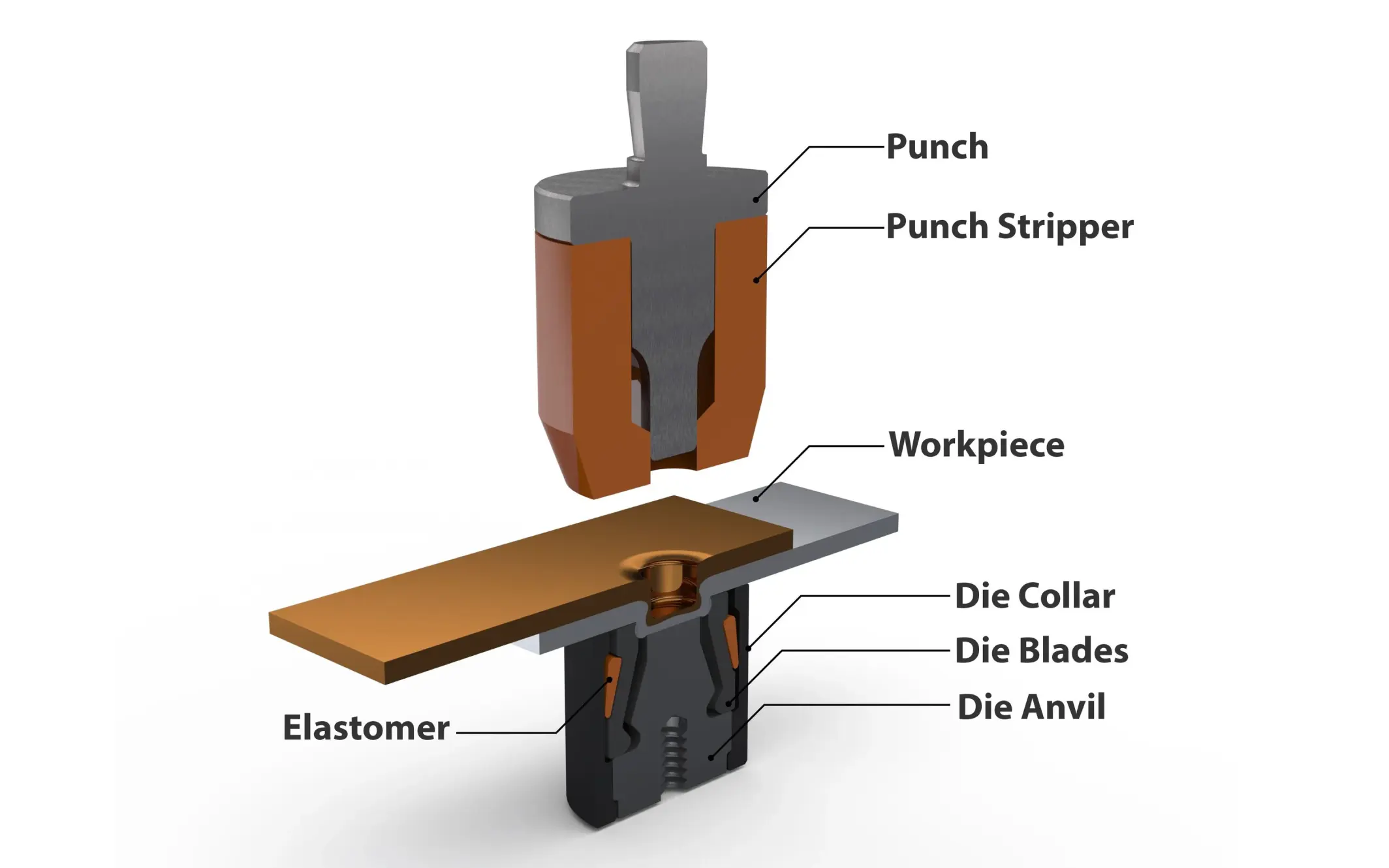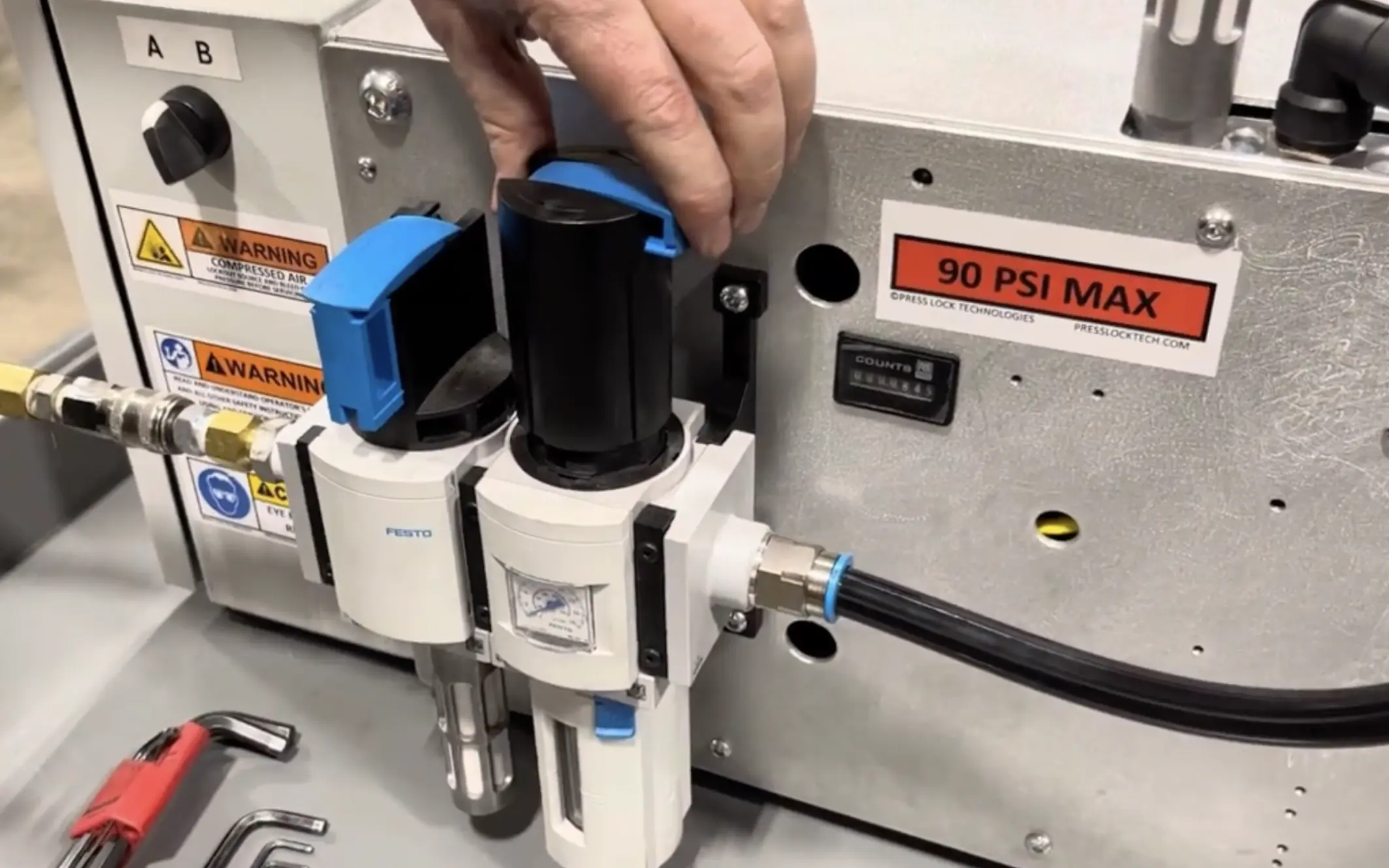
Buying used can be a smart, cost-effective option when purchasing industrial equipment like clinching machines.
This decision comes with its own set of considerations and potential pitfalls.
This guide will help you navigate the process and help you purchase a great machine.
Reasons to consider buying a used clinching machine
There are a few scenarios where buying a used machine might be the best option.
- When you don’t know if clinching is the right method for your application, investing in a used machine allows you to experiment without the financial commitment of a new machine.
- Your application doesn’t require consistent production. Used machines might require repairs and could be non-operational for some periods. If your production schedule can accommodate this downtime, a used machine could be a viable option.
- Low production volume. The high cost of a new machine might only be justifiable if your production volume is high. A used machine can fulfill your needs without breaking the bank.
- Tight budget. Buying used could be a way to get the necessary equipment without exceeding your budget, which is particularly useful for small businesses and startups.
- Buying a backup machine. If you already have a clinching machine and need a backup or if you can benefit from having two machines, buying used can be a practical solution. This also makes maintenance a lot easier.
How to find used clinching machines
Finding a used machine might take some time. These are some of the places you can start looking:
- Online marketplaces like MachineTools, BidSpotter, or Machinio. You’ll need to build enough experience to understand the normal market prices for used machines. That’s ultimately how you can judge whether you’re getting a good deal. Online marketplaces are great for that because they typically have a lot of variety, especially if you increase the radius you’re searching in.
- Auctions. Industrial auctions, whether offline and local or online like Machine Tools Bids, can offer a good number of options. Try to find a few locations that have either sold clinching machines before or are close to manufacturers that use them.
- Specialized dealers like Red River Machinery. Dealers who specialize in industrial equipment often have used machines in their inventory. They typically inspect and refurbish machines before resale as well, which could offer a degree of assurance about the equipment's condition.
- Manufacturer resale programs. Some manufacturers offer resale programs where they sell refurbished machines. These machines often come with a limited warranty and have been inspected by the manufacturer as well, which makes them more reliable.
- Resold by similar industries. Businesses in similar industries often sell their used equipment, usually because they need to upsize or make a change. In this case, you’re more likely to find them on generic marketplaces like eBay, where anyone can upload
Networking within your industry can uncover opportunities to buy well-maintained machines that are known to work well for your specific applications.
Finding local options for used machinery is typically going to be your best bet, just because it’ll be easier to connect with people, transport the machine, and find out what their experience with it has been like.
Start by finding out which specific machine you’d like to buy
Buying a used clinching machine is still a big commitment. They might not cost quite as much as a new machine would, but in many cases, they’ll take more time and effort from your side to maintain them.
Rather than browsing a website like eBay and picking any old machine, start by drilling down on what you need and selecting one or two machines you know will meet those needs. Then, look only for those.
You should:
- Clearly define what you need from the machine in terms of production capacity, features, and specifications. Understanding your requirements will help you narrow down your options.
- Ensure that technical support and replacement parts are readily available for the machine you are considering. This will save you time and money in the long run. One way to test this is by searching through the manufacturer’s website and trying to find a section for replacement parts. You can also Google to find alternative sellers who might stock those.
- Define a budget and stick to it. You’ll also need a buffer for potential repairs and maintenance. Balance cost-saving with the need for reliability.
- Confirm that you have adequate space for the machine in your facility, including room for operation, maintenance, and storage of parts. This might be the biggest factor to consider when you’re choosing which technology or what type of clinching machine you’ll need.
- Opt for brands known for durability and performance. Research reviews and gather insights from industry forums, but be mindful to validate the information independently.
Prices you can expect and how to identify red flags
Once you’ve done your research and have a couple of potential machines, look through what’s out there and watch out for these red flags.
- Obvious damage or signs of misuse. As with any used item, visible damage or signs of heavy wear and tear are not a good sign.
- There is no service history or documentation. Ideally, you want a machine that is regularly maintained. Some places might not have great documentation, but you should still discuss it with the seller and find out what type of maintenance was done.
- High operating hours or cycles. Some (but not all) machines have counters. If you come across a machine that has 10-20 million cycles, it’s worked pretty hard throughout its life. This doesn’t have to disqualify the machine immediately–you can still find reliable machines with that level of use–but that makes its maintenance history even more important.
- Unreliable sellers or suspiciously low prices. You can expect most used clinching machines to cost somewhere between $3,000 - $6,000. If it’s lower than that, it’s important to know exactly why it’s being sold. Sometimes sellers just want to get rid of the equipment because they need the space. Other times, it’s because they hate the machine or there’s some serious damage.
If you’re tight on cash, consider rent-to-own
Press Lock Technologies offers a rent-to-own program, where you can pay for a new clinching machine over time.
If your budget is tight, or you want some advice about clinching, our highly experienced team is happy to help you find a solution. Contact us here today!
Take our 5-day course
Get an article every day for 5 days
Don’t have time to read everything now? Sign up and we’ll send you an article every day for 10 days.



.webp)
